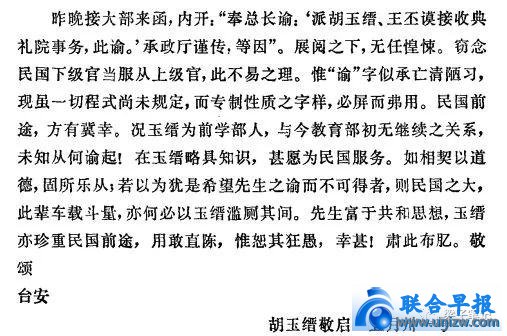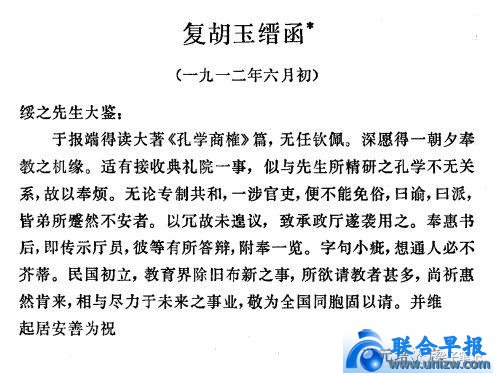The old president Cai Yuanpei, the soul of Peking University, also apologized for one word.
On February 12, 1912, the Qing Dynasty issued an abdication edict.So far, the history of the imperial system in 2132 has come to an end.
In March, Cai Yuanpei took office as the Minister of Education of the Republic of China, equivalent to the current Minister of Education.Because the country has just changed from an autocratic regime to a republican regime, Cai Yuanpei, as the leader of the education cause in the Republic of China, urgently needs talents to replenish his strength.
At this time, Hu Yujin, who was teaching at the Beijing Normal University, wrote an article discussing Confucianism.Cai Yuanpei was very interested in reading it, saw Hu Yujin's talent, and decided to invite him to work in the Ministry of Education.
Improper use of a word, sparking protests
Cai Yuanpei instructed subordinate officials to draft a letter, the content of which was to invite Hu Yujin to come to the Ministry of Education as a ceremony officer.Hu Yujin was still a nobody in the academic world at that time, and he should have been grateful to have someone like Cai Yuanpei recommend him.
The full text of the letter from the Ministry of Education to Hu Yujin reads: I received an order from the chief minister: lsquo; to send Hu Yujin and Wang Pimo to take over the affairs of the Ritual Academy.rsquo;Chengzheng Hall would like to pass it on, and so on.
Unexpectedly, after receiving the invitation letter, Hu Yujin wrote a letter of protest to Cai Yuanpei.
Hu Yujin was dissatisfied with the imperial characters for two reasons: 1. The imperial characters are bad customs and used by autocratic dynasties, and should be discarded now that they are in the Republic of China.
2. The imperial edict is a style in which superiors issue orders to subordinates in the government. I, Hu Yujin, was an official in the former Qing Dynasty. I have no affiliation with the current Ministry of Education, so you cannot issue orders to me. I don’t know where the edict came from.
The full text of Hu Yujin's letter to Cai Yuanpei:

A simple popular science
All official government documents, whether Chinese or foreign, ancient or modern, have a set of stylistic norms.This is not only a manifestation of the authority of official documents, but also the need for efficient information transmission.
According to the direction of information transmission, the official documents of the Chinese government can be roughly divided into upper-level, lower-level, and parallel.This principle is similar to Liang Zi's need to have a different tone of voice when speaking with elders, juniors, and peers when he is at home.
When talking to elders (upper text), you need to be more polite. Commonly used styles include asking for instructions and reporting. The main difference between the two is that asking for instructions requires a reply from the superior, but reporting does not.
For example, Liang Zi won the first place in the final exam. He was so happy that he hurriedly reported to his parents to let them know the good news.They don't need to reply.Another example, Muzi is 15 years old this year. He wants to buy a suit of clothes. He made up a reason and then asked his parents, should I buy it or not?If you buy it, give money?At this time, parents need a reply.
When talking to juniors (below), you don't have to be so polite, but be tough.However, there are still differences in different occasions and in different tones.Orders often announce major coercive administrative measures, with the highest standards; decisions are arrangements for important matters or actions, and are often policy-oriented, such as the decision of the Central Committee of the Communist Party of China on deepening the reform of party and state institutions, because the decision is policy-oriented, soThere is also a plan to deepen reform of party and state institutions.
Notice, this is the most commonly used style of writing, and it is also the main carrier of Wenshan Huihai. If the superior has a request, then directly forward the notice, and be a setter. Firstly, it is to deploy work, and secondly, it can also be blamed to the subordinates in the future..
The function of downward opinions is mainly to guide. It is not a mandatory and specific arrangement of work, but a reference to put forward the goals, tasks, principles and measures of the work.Lower-level agencies should generally follow the spirit and principles of the opinions of higher-level agencies for implementation.
Talking to your peers (parallel text) is mainly a letter.For example, the Ministry of Finance can only send a letter to the Henan provincial government if it has something to do, because they are all provincial and ministerial units.
In fact, to put it in the present, Cai Yuanpei should choose the style of letter.For example, if your unit wants to invite a university professor to give a lecture, it is naturally better to send an invitation letter instead of a notice.
Cai Yuanpei's apology
Cai Yuanpei's letter of apology is divided into two parts, and the attachment part is the apology from Chengzheng Office, which was responsible for drafting the manuscript.He admitted his mistakes from the very beginning, and he agreed with Hu Yujin that his arguments were quite correct.
Later, a simple explanation was given: mainly because the new government had just been established, the official document norms had not yet been stipulated, and the Ministry of Education did not create a unique style, so the imperial edict was used.Moreover, the words used here do not imply autocracy, I hope Hu Yujin doesn't mind.Finally, there is a sentence that the headquarters has just been established, and when it is employing people, if the feet of the sages are bound by the words of decrees and orders, it is against the original intention of the chief executive.
The main text is Cai Yuanpei's letter of apology. Liang Zi is also convinced that he came out to take responsibility for his subordinate's mistakes at work!
The main idea of the letter is to explain the reason for the invitation. I read Mr. Confucian Discussion article before, and I admire it very much.It just so happens that the Academy of Rituals needs to employ people, so I invite you to come (this is because the reason for the invitation was not explained in the previous edict, so it is added here).
Then, he explained that because he was busy with official duties, he didn't read it carefully, which caused the Chengzheng Office to follow the edict of the former Qing Dynasty.Small flaws in words and sentences, I don’t think it’s hard to compare others, I hope you have a lot of small flaws in words and sentences.Finally, let’s get back to the topic and invite Hu Yujin again. Since the founding of the Republic of China, there are many people who want to ask for advice on how to remove the old and introduce the new in the education field.

Cai Yuanpei's sincere apology letter, explaining the reasons, admitting mistakes, and inviting again.Its eagerness to recruit talents is vivid on the paper. Who wouldn't be moved after seeing such a reply?
Later, Hu Yujin readily agreed to work in the Ministry of Education, responsible for the preparation of the National Museum of History, as the director of the preparatory office.
Later, Cai Yuanpei became the president of Peking University, and Hu Yujin also went to teach at Peking University.



